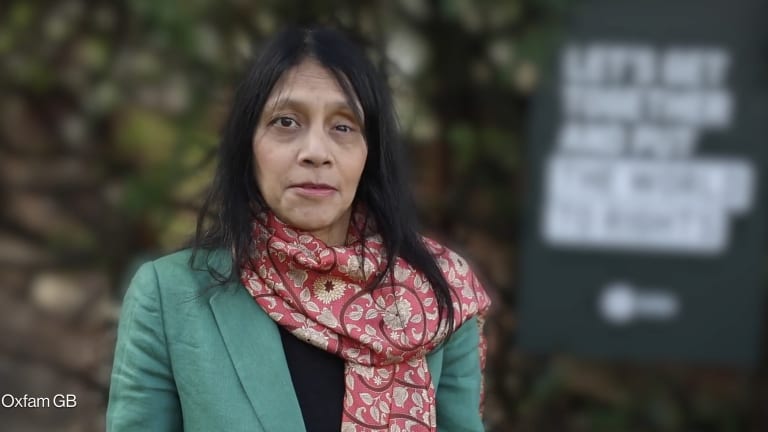
LONDON — Since revelations about Oxfam in February sparked a slew of allegations of sexual exploitation and abuse in the aid sector, agencies have been scrambling to design new policies to ensure such incidents are consigned to the past.
Creating a global register of aid workers is among several proposals made by the United Kingdom government and development organizations to improve standards and restore trust. Two groups are currently working to scope out how such a register might work in practice: One organized by international development network Bond, which is set to report at the Department for International Development’s International Safeguarding Summit on Oct. 18; the other convened by Save the Children, with experts from NGOs including Christian Aid, Oxfam, CARE International, and CAFOD, which is feeding into the Bond group.
“We are trying to see if [a register] is a workable solution to this really stubborn challenge the sector has had for many years,” said Steve Reeves, Save the Children’s director of safeguarding and co-chair of the Bond group.
The basic premise is that an individual’s employment history and background checks could be recorded and made available for potential employers. The hope is that such a register, operating globally, could prevent offenders from moving around the aid sector undetected, as reportedly happened after the Oxfam scandal. But observers predict practical obstacles may be hard to overcome.
What are the challenges?
In the wake of the Oxfam scandal, one of the key issues raised was the aid sector’s particular need to hire people at short notice following an emergency, which limits the time available to undertake checks. Reeves believes a register could both strengthen humanitarian response and save time. Managers would be able to access information about a person’s career history immediately, freeing them up to focus on other urgent tasks.
Both working groups are currently considering the possibility of using blockchain technology, which stores data online in millions of locations simultaneously — meaning no one owns it and it is protected from hackers. Such a platform would remove the question of who should own and have the right to share the employment history of thousands of aid workers, a question that raises several legal issues.
In the U.K., the law only allows employers to request detailed criminal record checks if they will be working with vulnerable groups such as children. Employers must then adhere to strict data storage regulations, usually having to destroy it within six months. If an individual owned this data, however, they would be allowed to share it without these restrictions, as long as they owned it in a way that also meant they could not alter it — a possibility with blockchain. “In technological terms [creating a secure register] isn’t amazingly complex,” said Reeves. “The real [challenges] are about how workable it is in different contexts.”
Creating a uniform system of checks and references within the U.K. context should be relatively straightforward, experts told Devex. Oxfam, for example, has already implemented new policies that require potential hires to provide references signed off by an HR department, rather than by an individual, which restricts the ability of candidates to hide poor references. With help from the Steering Committee for Humanitarian Response, Oxfam is trying to coordinate with other NGOs to agree to a uniform referencing process with set questions. Once agreed, they envisage adding these checked employees to an online portal.
Legal councils of the NGOs involved in that process are providing advice about how to overcome problems around data-sharing. Oxfam’s humanitarian lead Richard Corbett said organizations have to strike a balance between what data might be risky, in legal terms, to share, and what is right for individuals. A fear of being exposed to defamation cases has sometimes led employers to withhold information about former employees.
“In the U.K., Oxfam has decided it will potentially go against legal advice with what it would and wouldn’t share in terms of information, because of the nature of that information, and the importance of sharing information if it’s something that should go to another agency,” he said.
But the big question hanging over the global register is how to make it operate internationally, in places that may not have equivalent police checks, or where individuals do not keep employment history data, cannot access an online portal, or may not even have personal identification documents.
Street Child’s global director of fundraising, Chloe Brett, says if all employees had to be registered on such a scheme, it would have a huge impact on employment opportunities in the countries where her organization works. “The logistics of securing the correct ID documents and getting these into a central system from places where charity work is most needed — that are cut off by war, lack of roads, lack of power — would be enormous,” she said.
“If charities put the burden on the aid worker then the recruitment pool would be even more narrow. It is already a huge challenge finding skills and capacity when working in difficult contexts. In an emergency such as the Ebola response, which Street Child was at the heart of, when surge capacity and quick response is needed, my prediction is there simply wouldn't be enough people registered to cope with the demand,” Brett said.
Others have suggested that such a register would disproportionately impact local staff, who are less likely to be able to procure the necessary documentation.
“It would cause real problems if donors would say, ‘we’re only going to give money if everyone’s got x, y, and z accreditation,’ and that is only possible for people who come from areas like the U.K., Europe, and the U.S.A.,” said Corbett. He suggested such a stance could impact fundraising for charities that can’t meet the demands, but believes donors will understand the difficulties of gaining equivalent checks from international criminal agencies.
Reeves is also adamant that a solution to these challenges can be found. “If this were straightforward, it would have been done a long time ago,” he said. “We’ve got commitment from a number of specialists saying ‘we think this is something that can contribute to a solution,’ and we shouldn’t give up at the first hurdle.”
Extended timeline
If practical challenges in creating the register can be addressed, the next question is who will pay for it. Reeves believes no price can be put on the impact a register could have in protecting vulnerable people. Nevertheless, smaller charities have already been challenged by DFID’s requirement for larger safeguarding operations. Ben Simms, head of the Tropical Health and Education Trust, says the body has been helping partner organizations overseas improve policies and procedures.
“We're not paid to do that,” he said. “Our grant doesn't extend to those costs. We're a pretty small charity and it feels like a feeble objection, but there have to be limits to what expectations we can have on charities to keep and share records.” While DFID’s new commitment to offer full cost recovery on grants could help, it still looks like a stretch, he added.
If staff registration became a requirement for DFID-supported projects, the extent to which it would apply not only to a charity’s employees but also the staff of partner organizations is another unresolved question. Harriet Knox, international programmes director at Y Care International, explained: “Everyone working on a YCI supported or directed project in any location will be required to agree and sign a code of conduct setting out our safeguarding expectations,” she explained. “But they’re employed under the laws of the country they work in, and the partner’s regulations, policies, and procedures. They are not employed by us.”
A host of practical obstacles means any global register would take a significant amount of time to produce. Bond Director of Membership and Communications Mike Wright predicts it could be as long as 10 or 15 years before it materializes.
But appetite for some form of register in the sector seems to exist. Deputy CEO of Plan International UK Simon Bishop said his organization is exploring a range of reforms to enhance safeguarding, including the register concept. UNICEF Executive Director Fatoumata Ndiaye also said her organization is working on a United Nations-wide database of staff who have allegations or confirmed cases of sexual misconduct against them.
And while the practical details are still being worked out, a report on sexual exploitation and abuse published by the International Development Committee in July suggested DFID should “secure commitment [for a register] at the International Safeguarding Conference” next week.








